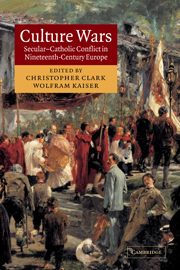Book contents
- Frontmatter
- Contents
- List of illustrations
- List of contributors
- Introduction: The European culture wars
- 1 The New Catholicism and the European culture wars
- 2 ‘Clericalism – that is our enemy!’: European anticlericalism and the culture wars
- 3 ‘Priest hits girl’: on the front line in the ‘war of the two Frances’
- 4 The battle for monasteries, cemeteries and schools: Belgium
- 5 Contested rituals and the battle for public space: the Netherlands
- 6 Nonconformity, clericalism and ‘Englishness’: the United Kingdom
- 7 The assault on the city of the Levites: Spain
- 8 Roma o morte: culture wars in Italy
- 9 Enemies at the gate: the Moabit Klostersturm and the Kulturkampf: Germany
- 10 Village quarrels and national controversies: Switzerland
- 11 The Counter-Reformation's last stand: Austria
- 12 The uncivil origins of civil marriage: Hungary
- Annotated bibliography
- Index
2 - ‘Clericalism – that is our enemy!’: European anticlericalism and the culture wars
Published online by Cambridge University Press: 23 July 2009
- Frontmatter
- Contents
- List of illustrations
- List of contributors
- Introduction: The European culture wars
- 1 The New Catholicism and the European culture wars
- 2 ‘Clericalism – that is our enemy!’: European anticlericalism and the culture wars
- 3 ‘Priest hits girl’: on the front line in the ‘war of the two Frances’
- 4 The battle for monasteries, cemeteries and schools: Belgium
- 5 Contested rituals and the battle for public space: the Netherlands
- 6 Nonconformity, clericalism and ‘Englishness’: the United Kingdom
- 7 The assault on the city of the Levites: Spain
- 8 Roma o morte: culture wars in Italy
- 9 Enemies at the gate: the Moabit Klostersturm and the Kulturkampf: Germany
- 10 Village quarrels and national controversies: Switzerland
- 11 The Counter-Reformation's last stand: Austria
- 12 The uncivil origins of civil marriage: Hungary
- Annotated bibliography
- Index
Summary
Spaniards always stand behind their priests – either with candles in hand to light a procession, or with sticks to beat them up. As this old joke suggests, both Catholic popular piety and militant anticlericalism took on forms in the Iberian peninsula that were extreme by European standards. But the joke also reminds us that the culture wars waged across Europe against clerical influence and ultramontanism were not confined to liberal elites and were not fought solely with parliamentary speeches, secularising legislation and state repression of church autonomy.
German and Italian liberals used anticlerical rhetoric and parliamentary initiatives to expedite national integration at the expense of the Catholic church; moderate French republicans sought in the tradition of Voltaire to purge the secular state of all political activity by priests and church institutions. But political activism of this kind constituted only one level of the European culture wars. Anticlericalism was also a mass phenomenon with deep social roots. In the extra-parliamentary sphere, its primary agents included religious groups and institutions. The most important of these were liberal Catholicism, nonconformist liberal Protestantism in the predominantly Protestant states of central and northern Europe, and the various religious minorities who anticipated that a political victory over ultramontane or orthodox Protestant clericalism would bring about their complete legal and social emancipation. Equally important, however, were those emphatically anticlerical organisations, such as the freemasons and the free-thinkers of France, Belgium and Italy who cultivated close ideological and personal links with the progressive parties.
- Type
- Chapter
- Information
- Culture WarsSecular-Catholic Conflict in Nineteenth-Century Europe, pp. 47 - 76Publisher: Cambridge University PressPrint publication year: 2003
- 12
- Cited by



